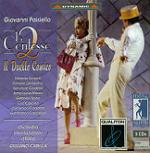Here are two comic operas by Paisiello, taped live in July, 2002 at the Martina Franca Festival. In Le due contesse, when the Countess and her suitor Leandro leave for vacation, and a widower–Cavaliere–comes to the door looking for the Countess, the servants Livietta and Prospero tell the Cavaliere that she, Livietta, is the Countess. Cavaliere begins to court her. Guess what? Yup–the real Countess and Leandro come back and Livietta tells the Cavaliere that she’s allowing her servant, really the Countess, to act like a Countess. Prospero tries to convince the real Countess to pay attention to the Cavaliere (who, by now, is confused), and this makes Leandro jealous. Anger/mirth ensues; a duel is suggested but is averted. The real Countess, in fact, falls for the Cavaliere, and somehow Livietta gets together with Leandro. The end.
Coming in at an hour and 50 minutes, and containing 20 short numbers and plenty of recitative, it’s not hard to become tired of such shenanigans; but this performance has great energy and the singers are quite good. Duets and ensembles are as frequent as brief arias. The finale to the first part (the challenge to the duel) is a witty allegro-presto; the second finale–an extended number (sort of a simple-minded version of a Mozart finale)–is similarly involved and all the singers are right-on. This production was apparently well-rehearsed. The Cavaliere and Leandro (tenors Daniele Zanfardino and Salvatore Cordella, respectively), both light-voiced, are nicely differentiated and handle their quick music as well as the two sopranos, with Stefania Donzelli’s Countess especially well-tuned and Anna Lucia Alessio’s Livietta nice and spicy. Baritone Gabriele Spina’s Prospero avoids all buffo misbehaviour. A nice touch in this opera is the entrance aria of the Cavaliere: mourning his wife, he quotes from Gluck’s “Che faro senza Eurydice?” (This opera, by the way, was first performed in Rome in 1776 with an all-male cast. Why not try it that way again?)
The second opera, Il duello comico, is half the length. The main characters, Bettina (Donzelli again, and even lovelier) and her suitor, Don Policronio (baritone Domenico Colaianni, colorful and also quite good), though living in Naples, speak French and act “fancy”. Yet another Leandro (Zefardini again, in a sometimes very low-lying role that suits him better than the tightly-produced high moments) also is in love with Bettina. There is a fake duel in which Policronio thinks he’s killed Leandro. The latter is about to “return to life” when his ex-girlfriend, Clarice, shows up. The first two and second two couples unite at the end. The fake duel is all in recitative and it’s very effective; the use of French by the hoity-toity duo is very funny.
As suggested, preparation and leadership are excellent, with conductor Giuliano Carella taking these works as seriously as one would Mozart’s. The orchestra is capable but without very ingratiating tone, and Paisiello’s orchestration is hardly interesting in any case. If this sort of just-before-Mozart comic opera is your cup of tea, these two nicely-performed rarities are recommended.
































